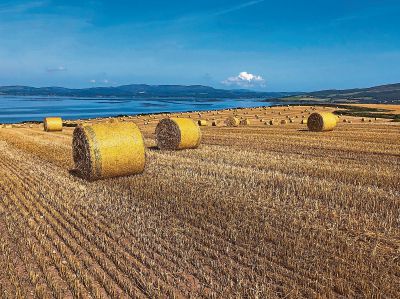By Sabrina Sweeney
THERE’S barely a day that goes by without someone talking about the price of groceries.
More than ever, the weekly food shop has become one of the clearest reminders of rising costs. Fruit, vegetables and meat are among the staples that have increased the most and households feel it at every checkout.

It can be easy to assume that if food is costly, then the farmer is doing well.
However, farmers are feeling the pinch in other ways because feed, fertiliser and fuel remain expensive and the return they get for their work has not kept pace.
Ultimately, higher prices in the shop don’t necessarily mean life is easier on the land. And there’s also a human reality to the job of a farmer that’s equally important but not talked about as much.
Farmers are people and like everyone else they need social connections to keep their minds healthy. Work pressures, early mornings, late nights and the solitary nature of the job have all been known to take their toll.
Thankfully, there is a growing understanding that farmers are not immune from the effects of stress. Research from DCU earlier this year found that almost one in four Irish farmers report frequent burnout, with half experiencing ongoing problems with sleep.
Another national survey led by UCD showed that more than half of farmers had symptoms of moderate to severe depression, and almost a quarter were considered at risk of suicide. These are not distant statistics. They represent people in communities here in Donegal.
The nature of farming makes it hard to step back and unlike many jobs, it cannot be left behind at the end of the day. Animals, the land and the weather don’t wait and the result is long hours, little rest and a constant sense of responsibility.
There are also fewer opportunities for connection. In the past, there were more natural meeting points, such as the mart or the cooperative. But many marts now run partly online, with fewer farmers travelling in, while rural depopulation has left clubs and community gatherings thinner on the ground.
Additionally increased paperwork and compliance leave little spare time to meet and talk. That’s why the Donegal Farmers’ Harvest of Hope, which takes place in the Clanree Hotel on Sunday, October 12, is an important addition to the rural calendar. With music and activities for the family, it will have the feel of a festival, however, its message carries real weight.
Farmers are telling us they are at breaking point and if stress and mental health issues continue to rise, the danger is not only to the wellbeing of individual farmers but to the future of farming itself.
The county already has examples of initiatives that help. The Men on the Move programme in Rossnakill in Fanad, shows how a weekly session of exercise and conversation can make a difference, while the Rural Social Scheme, run by Donegal Local Development Company, provides income support but also opens doors into community life.
These initiatives remind us that wellbeing is often found in company and connection and in the knowledge that you are not alone. Their message is clear: Wellbeing in farming is not an extra. It’s as central as any piece of machinery or veterinary care.
Farmers themselves have a role to play, by recognising when they need to reach out. But there is also a wider duty, whether that’s organisations creating space for connection, government ensuring that mental health services are accessible and properly funded or the general public appreciating the difficult economic climate is not easy on farmers either.
Harvest has always been a vital time in the year for farming families, a moment of gathering in and taking stock. At a time when both households and farms feel squeezed, it’s worth remembering the people behind the produce.
Farmers don’t want to see their food priced out of reach. Most want to be part of a fair system where families can eat well and producers can make a living without sacrificing their health.
Healthy farming sustains us with good food, but relationships and community sustain us as people, and farmers need that just as much as anything else.










